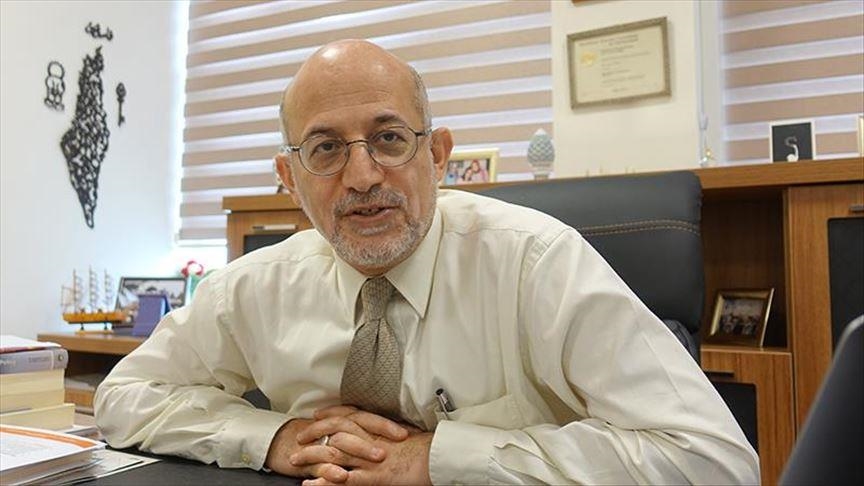ANKARA, TURKEY
The brutal attacks by Israeli police on Muslim worshippers in occupied East Jerusalem aim to divide Al-Aqsa Mosque into two sections, while Tel Aviv “appears to believe” that its newfound friends in Arab regimes will fend off any backlash from the Muslim world, say experts.
“It’s a continuous attempt by Zionists to empty Jerusalem from Palestinians and settle Jews,” Sami Al-Arian, an Istanbul-based global policy expert of Palestinian ethnicity, told Anadolu Agency.
“Extremist settlers are trying to force the division of Al-Aqsa into Jewish and Muslim areas as they did with the Ibrahimi Mosque in Hebron decades ago. But the Palestinians in Jerusalem are resisting and that’s why you have clashes, as soldiers are engaged on behalf of the settlers,” said Al-Arian, who leads the Center for Islam and Global Affairs (CIGA) think tank in Istanbul.

Sami A. Al-Arian, director of the Center for Islam and Global Affairs (CIGA)
Israeli police launched attacks on Muslim worshippers since late Friday inside Al-Aqsa Mosque. Hundreds of Palestinians have been injured in the clashes, the Palestinian Red Crescent said in subsequent statements.
Israel continued its intervention at regular intervals against Muslims at the mosque while worshippers continued to perform tarawih — special nightly prayers during the Muslim holy month of Ramadan.
Al-Aqsa Mosque is the world’s third-holiest site for Muslims. Jews call the area the “Temple Mount,” claiming it was the site of two Jewish temples in ancient times.
Israel occupied East Jerusalem, where Al-Aqsa is located, during the 1967 Arab-Israeli war. It annexed the entire city in 1980, in a move never recognized by the international community.
‘Tel Aviv feels Arab regimes can fend off backlash’
Condemning the attacks, Malaysia-based Ahmad Azam Ab Rahman said by phone from Kuala Lumpur that Israel seems “determined as ever to flaunt its arrogance and brutality, believing that it is invincible and untouchable, that all of its blatant malice and mischief will just be muffled and brushed over by its loyal coterie of Western allies.”
“Israel appears to believe that its newfound friends in the Arab regimes will suppress and fend off any backlash or repercussions from the Arab and Muslim world,” said Rahman, who is deputy secretary-general of the Union of NGOs in the Islamic World, which is headquartered in Istanbul, Turkey.
In 2020, the United Arab Emirates (UAE), Bahrain, Sudan, and Morocco announced controversial normalization agreements with Israel following moves decades ago by Egypt and Jordan, which signed deals with Israel in 1979 and 1994, respectively.
During a White House ceremony on Sept. 15 last year, the UAE and Bahrain signed the US-sponsored deal, officially known as the Abraham Accords, to establish diplomatic relations with Israel.
Al-Arian agreed. “Spectators. Powerless,” he said about the Arab regimes. “Because major countries that finance it such as Saudi Arabia and the UAE are already allied with Israel. So what would we expect from the Organization of Islamic Cooperation [OIC]?”
Rahman told Anadolu Agency that Israel acts with such “increasing callousness to test the limits of their oppression.”
“It is time again for the world to act, for the United Nations to stop this rogue apartheid state and for the OIC to reassert itself to champion the cause of the oppressed to demand justice,” he said.
“Jerusalem and Palestine have to be liberated immediately to stop this heinous aggression and crime against humanity,” added Rahman, who also leads the Malaysia-based Movement for an Informed Society or WADAH.
‘Pattern to humiliate Palestinians during holy days’
Pakistani Senator Mushahid Hussain told Anadolu Agency that there is a “pattern of the Israeli occupation army to humiliate Palestinian Muslims especially during the holy month.”
“It is to bully and browbeat Palestinians,” said Hussain, who heads the Pakistan Senate’s Foreign Affairs Committee. “This is an issue of humanity, international law and the UN charter.”
“It is unfortunate that the postponement of Palestinian elections has adversely affected the unity of the Palestinian organizations – [between] Gaza-based Hamas and West Bank-based Fatah,” he added.
Late last month, Palestinian President Mahmoud Abbas announced the postponement of elections until the Israeli authorities permit holding the elections in Jerusalem, triggering condemnation from Gaza.
The parliamentary polls were expected to be held on May 22, presidential polls on July 31, and Palestinian National Council polls on Aug. 31.
“They were the first elections to be held after 15 years,” said Hussain.
According to Hussain, the “unity” efforts between Hamas and Fatah were a “major development.”
“Unity is a cause of concern for Israel, which runs a colonial concept of divide and rule,” he said.
“These unity efforts were the result of a long negotiation.”
“Israel will try to exploit the abrupt postponement of Palestinian elections, but it will also unify the resistance to the Israeli occupation,” said the Pakistani lawmaker.

